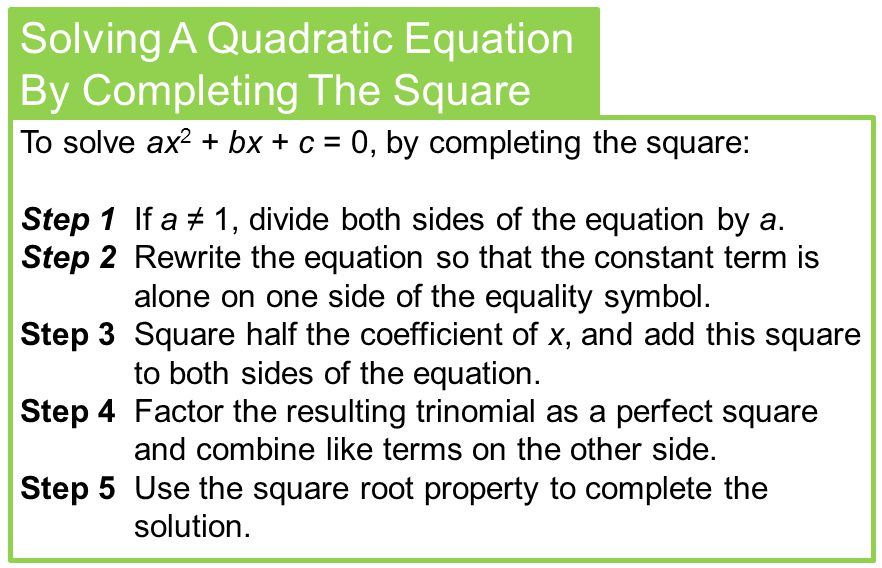Solving A Quadratic Equation By Factoring
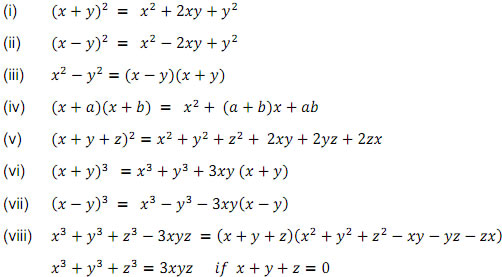
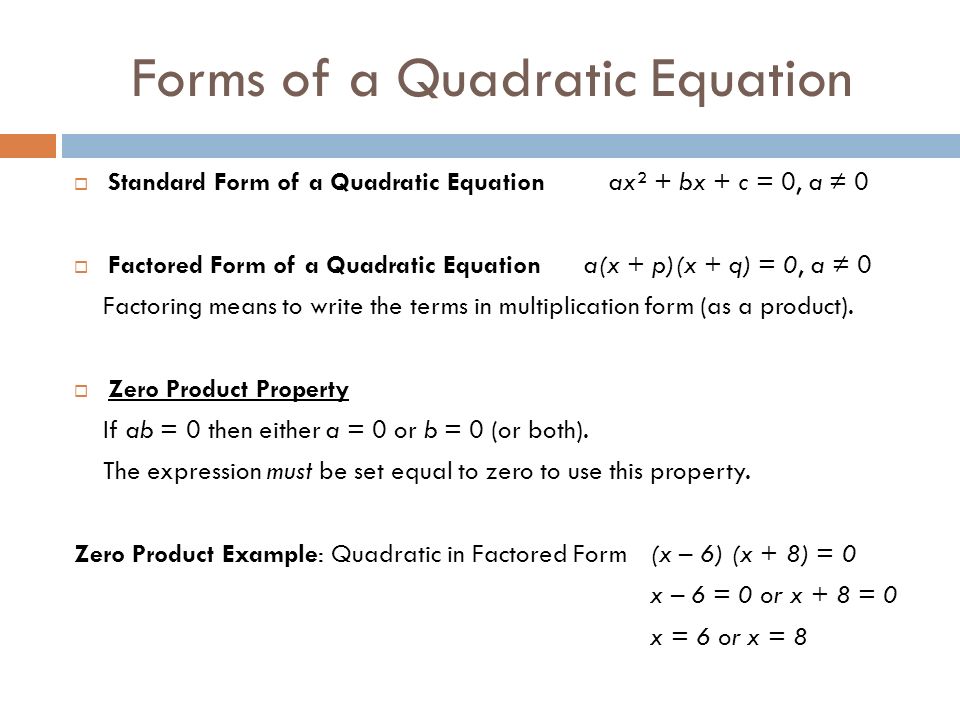
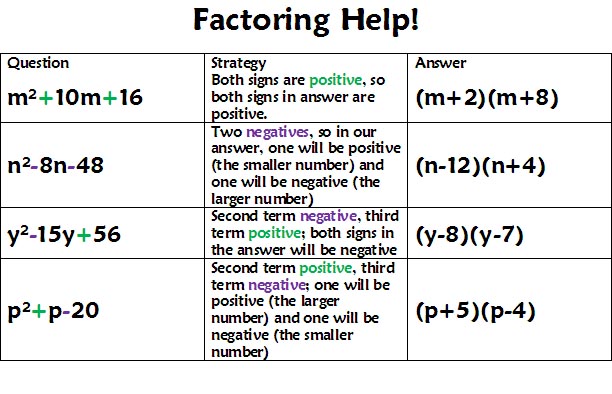
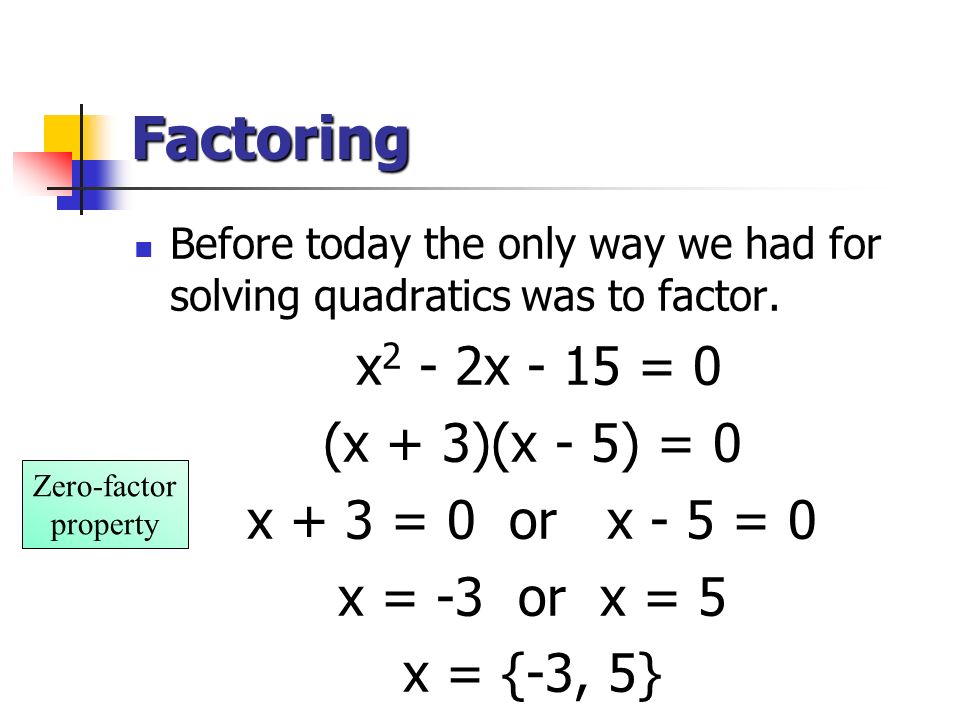
Since, 3x2 – 5x + 2 is a quadratic polynomial;
3x2 – 5x + 2 = 0 is a quadratic equation.
Also,
3x2 – 5x + 2 = 3x2 – 3x – 2x + 2 [Factorising]
= 3x (x – 1) – 2(x – 1)
= (x – 1) (3x – 2)
In the same way :
3x2 – 5x + 2 = 0 ⇒ 3x2 – 3x – 2x + 2 = 0 [Factorising L.H.S.]
⇒ (x – 1) (3x – 2) = 0
i.e., x – 1 = 0 or 3x – 2 = 0
⇒ x = 1 or x = 2/3
which is the solution of given quadratic equation.
In order to solve the given Quadratic Equation:
1. Clear the fractions and brackets, if given.
2. By transfering each term to the left hand side; express the given equation as
ax2 + bx + c = 0 or a + bx + cx2 = 0
3. Factorise left hand side of the equation obtained (the right hand side being zero).
4. By putting each factor equal to zero; solve it.
Solving A Quadratic Equation By Factoring With Examples
Example 1: Solve (i) x2 + 3x – 18 = 0 (ii) (x – 4) (5x + 2) = 0
(iii) 2x2 + ax – a2 = 0; where ‘a’ is a real number.
Sol. (i) x2 + 3x – 18 = 0
⇒ x2 + 6x – 3x – 18 = 0
⇒ x(x + 6) – 3(x + 6) = 0
i.e., (x + 6) (x – 3) = 0
⇒ x + 6 = 0 or x – 3 = 0
⇒ x = – 6 or x = 3
Roots of the given equation are – 6 and 3
(ii) (x – 4) (5x + 2) = 0
⇒ x – 4 = 0 or 5x + 2 = 0
x = 4 or x = – 2/5
(iii) 2x2 + ax – a2 = 0
⇒ 2x2 + 2ax – ax – a2 = 0
⇒ 2x(x + a) – a(x + a) = 0
i.e., (x + a) (2x – a) = 0
⇒ x + a = 0 or 2x – a = 0
⇒ x = – a or x = a/2
Example 2: Solve the following quadratic equations
(i) x2 + 5x = 0 (ii) x2 = 3x (iii) x2 = 4
Sol. (i) x2 + 5x = 0 ⇒ x(x + 5) = 0
⇒ x = 0 or x + 5 = 0
⇒ x = 0 or x = – 5
(ii) x2 = 3x
⇒ x2 – 3x = 0
⇒ x(x – 3) = 0
⇒ x = 0 or x = 3
(iii) x2 = 4
⇒ x = ± 2
Example 3: Solve the following quadratic equations
(i) 7x2 = 8 – 10x (ii) 3(x2 – 4) = 5x (iii) x(x + 1) + (x + 2) (x + 3) = 42
Sol. (i) 7x2 = 8 – 10x
⇒ 7x2 + 10x – 8 = 0
⇒ 7x2 + 14x – 4x – 8 = 0
⇒ 7x(x + 2) – 4(x + 2) = 0
⇒ (x + 2) (7x – 4) = 0
⇒ x + 2 = 0 or 7x – 4 = 0
⇒ x = – 2 or x = 4/7
(ii) 3(x2 – 4) = 5x
⇒ 3x2 – 5x – 12 = 0
⇒ 3x2 – 9x + 4x –¬ 12 = 0
⇒ 3x(x – 3) + 4(x – 3) = 0
⇒ (x – 3) (3x + 4) = 0
⇒ x – 3 = 0 or 3x + 4 = 0
⇒ x = 3 or x = –4/3
(iii) x(x + 1) + (x + 2) (x + 3) = 42
⇒ x2 + x + x2 + 3x + 2x + 6 – 42 = 0
⇒ 2x2 + 6x – 36 = 0
⇒ x2 + 3x – 18 = 0
⇒ x2 + 6x – 3x – 18 = 0
⇒ x(x + 6) – 3(x + 6) = 0
⇒ (x + 6) (x – 3) = 0
⇒ x = – 6 or x = 3
Example 4: Solve for x : 12abx2 – (9a2 – 8b2) x – 6ab = 0
Given equation is 12abx2 – (9a2 – 8b2) x – 6ab = 0
⇒ 3ax(4bx – 3a) + 2b(4bx – 3a) = 0
⇒ (4bx – 3a) (3ax + 2b) = 0
⇒ 4bx – 3a = 0 or 3ax + 2b = 0
⇒ x =3a/4b or x = – 2b/3a
